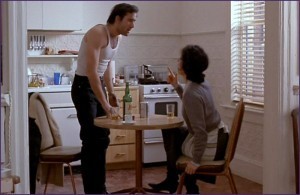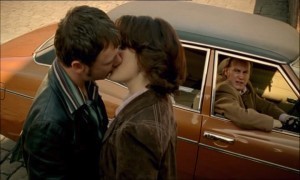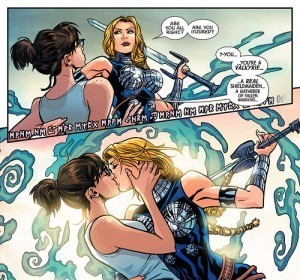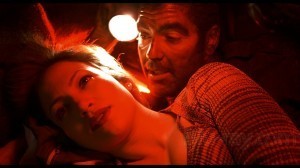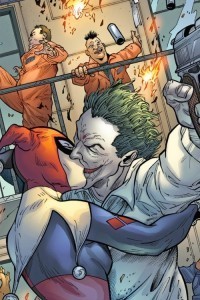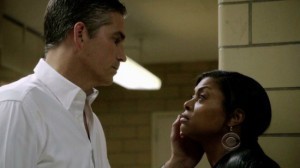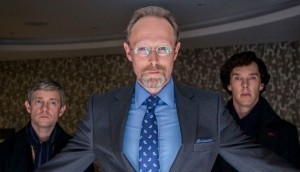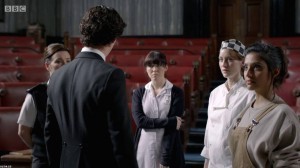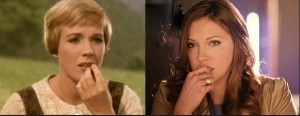Jennifer Crusie's Blog, page 277
February 15, 2014
Cherry Saturday: Feb. 15, 2014
Today is National Gum Drop Day. A one-pound bag is $2.90 on Amazon. Filling the cavity eating that many gumdrops will cause will be $290.00.

February 14, 2014
Questionable: Good Love Scenes
Happy Valentine’s Day!
Now snap out of it, we have work to do.
What makes a good love scene? What’s your favorite?
Keep in mind that “love scene” does not necessarily mean “sex scene,” is just means a scene that takes romance and fills your heart and soul with it, or at least makes you feel a little squishy inside.
We’re talking any kind of story–fiction, comics, movies, TV, whatever–so knock yourselves out.
Once we have the discussion going, I’ll sort through it all and make a better post with more specific questions.
Think of this as the research part. So . . .
What are some of your favorite love scenes and why?
ETA: Go check out the Google Doodle today; it’s lovely (and thank you, Katie Redhead!).

February 13, 2014
Arrow Thursday: Protagonists
Since my obsession with Arrow doesn’t seem to be abating, I’m going to put up a post the day after the show airs for the rest of this season. I’ll try to talk about writing craft, but sometimes you just have to say, “Oliver, you dumbass, you deserve everything you’re going to get for that.” But first, this:
Community Rules: Treat everyone with courtesy and respect. Do not say somebody is wrong, say “I respectfully disagree.” Any comment that refers to anyone in a derogatory way is going to get trashed. Any comment in a sarcastic, snide, or demeaning tone will be trashed even faster. Any comment that refers to Oliver as a man-whore is okay.
Of course, the show isn’t coming back until Feb. 26, so maybe this is a good time to look at some of the major aspects of the story in general. Like, say, Our Protagonist, Oliver Queen.
Yeah, he’s kind of grim.
The Protagonist is the character who owns the story. His goals, his drives, his hang-ups, his screw-ups fuel the story. (He does not make the story, though; that’s the antagonist who shapes the narrative in the way he or she pushes back.) Therefore when designing a protagonist you need somebody who is . . .
• Fascinating (because he’s the guy we’re going to follow through the story)
• Flawed (because people who never make mistakes are not fascinating)
• Sympathetic or at least Understandable (which means he should not kick puppies or sleep with sisters)
• Vulnerable (gonna have to balance the abs-and-arrows with something that could kneecap him)
• Driven (has a strong goal he’ll die to achieve)
For the first episode, Oliver was pretty much abs-and-arrows, but that was needed to establish the baseline. On the island, he was mostly wimp-and-whine, but that was good, too; it showed how far he’d come in five years. Leaving Oliver to grim fortitude, however, was going to make viewers turn the channel, which in fact many of them did. So the key with protagonists is to establish them in their stable lives quickly and then start throwing rocks at them, goading the protagonists to actions that will cross boundaries and change their characters or at least their expressions.
The problem was that, as a vigilante, Oliver was already crossing boundaries: he put on a hoodie at night and went around the city shooting arrows into rich people. After several episodes of this, it got old and kind of depressing. Meanwhile back on the island, Wimp-N’-Whine was changing and growing. It almost seemed as if the writers felt that Oliver’s growth on the island meant he didn’t have to grow in the present. They did try to throw rocks at him by giving him a really angry ex-girlfriend, but since that just made Oliver more stoic, it wasn’t a help. In order to get a protagonist out of his stable world, you need to get his attention, shock him awake so that he moves out of his rut and starts plowing new paths.
In the case of Arrow, Oliver met two people new to him, people he didn’t have history with, people he was going to have to establish new relationships with. The people from his old life automatically saw him as the old Oliver; new people didn’t have that to fall back on, so he had to readjust. It’s not surprising that it’s the new people–Diggle and Felicity–who see him as he really is; they don’t have any investment in who he used to be. New relationships mean new paths and–once Diggle and Felicity joined him in the bat cave–a new life with a new family. They were the catalysts who turned the story around because they turned Oliver around; if you trace Oliver’s character arc from the first episode to the present, the things that have had the most impact on him aren’t his best friend’s death and the earthquake machine; those things just made him grimmer. The big catalysts are Diggle and Felicity.
That means that when you watch Arrow, you get three Oliver Queens: the old Oliver on the island, the new Oliver pretending to be the old Oliver in Starling City, and Arrow, the hero who works with Diggle and Felicity to save the city. Oliver does pretty well when he keeps those three identities separate, its when he gets them confused that people tend to say, “Oliver, you’re an idiot.”
Even so, he’s a great protagonist: driven, active, skilled, sympathetic (mostly), vulnerable because of his connections to people, and constantly evolving. He makes mistakes which is important in a hero-protagonist–you don’t learn if you don’t make mistakes–he generally cleans up after his mistakes, also important in a hero-protagonist; he admits others to his secrets and treats them as equals; he evolves a kind of moral code (he really is trying to stop killing people); he interacts with family and friends and doesn’t consider himself above them; and he’s not good at everything, which makes him a lot more human. Some of Oliver’s best moments are when he’s unsure: asking McKenna out on a date, telling Felicity that he needs her, trying to endorse his mother for mayor right after he’s learned that she’s a liar and a cheat. He also has a dry sense of humor that offsets all the grim, and he’s content to be a straight man for the more mercurial members of the cast, confident enough in himself not to demand the spotlight. There’s a reason this show is so popular, and about half of it is because Oliver Queen is a great protagonist.
Now if he’d just quit doing sister acts . . .
Bonus: Here’s a short history of the Green Arrow in comics.

February 12, 2014
Questionable: Character Watch-ability
I ask for questions and then I think of one myself.
What makes a character watch-able? I don’t just mean on film, on the page, too. We talk about making characters likable, but I think the key isn’t likability, I think it’s that they have to be fascinating, there has to be something about them that when they show up on the page, you’re glad to see them even if they’re sons and daughters of bitches. So what does that?
“Likable” is easy–make your characters kind, make them funny, make them skilled, make them loyal, etc.–and I think a big mistake writers make is to strive to make their protagonist only likable, god forbid they should have flaws like normal people, and then slap an EVIL label on the antagonist, which gives them cardboard on both sides. What I want to know is what makes a character so interesting that you’re happy to see him or her when you turn the page even if he or she is going to be sticking knives into the protagonist. Cordelia in Buffy in a good example, but there’s also Root in Person of Interest, Andy on Sleepy Hollow, or God knows, Henry Parrish, now that we know he’s the second Horseman of the Apocolypse and has buried our hero alive. I can’t wait to see him again. The Blacklist has an amoral, terrorist-assisting, probably psychopathic multiple murderer as a protagonist and I love him. So we’re not talking about likable. We’re talking about not-look-away-able, if you will. What does that? As much as I love vulnerability, it’s not that. Of course, all of those people are played by very good actors, some of them damn near legendary, so that doesn’t hurt, but all that does is extend the question: what are those actors giving those awful, awful characters that makes them so wonderful?
And then the flip side: how can you build a character from a young woman who put herself through law school and then joined a pro bono street firm in a bad part of town, a woman made vulnerable by grief and loss but fearless at confronting the bad guys in the city, and somehow end up with somebody unsympathetic and unlikable? If you’ve done all the detail work right, where does it go wrong? This is one of the reasons I stopped watching Castle (along with dumb plots and no character arc, but that’s another blog post): I couldn’t stand the lead character. And yet she was hardworking and no-nonsense, she ran her team with intelligence and fairness, coped with great tragedy from her past, refused to impressed by flashy celebrity, and didn’t dress like a hooker cop. All the stuff was there, and yet . . . . It’s happened in books, too, characters that said and did all the right things that I actively wished would go away. How does that happen?
If you’re expecting me to end this with an answer, sorry, I’m in the figuring-it-out part, but I do have some guesses. (Please note, I said GUESSES, not answers.) I think a lot of it is passion; if characters really care about something, even if they are completely wrong-headed and horrible, they’re fascinating to watch. That’s Root on Person of Interest: a murderous, batshit crazy computer genius who cheerfully tortures and kills to get what she wants; I’m so glad she’s a regular now (especially since the Machine won’t let her kill any more). I think, too, it’s how alive they are, how much their passion fills up the page; Cordelia’s a good example of that, larger than life, breathing fire at every turn. Or maybe it just goes back to “fun to watch,” the unpredictability of characters with no limits, like Red on Blacklist who will do and has done damn near anything.
But I’m starting to think it’s more about the character’s relationship to the story. We’ve talked about how poisonous negative goals are, the basis of the character who constantly says, “I don’t want that, I don’t like that.” Most of the characters I respond to, I think, are positive goals people. Not just people like Buffy who is positive she wants to hunt down vampires and save the world, but also people like Root who is positive she wants to find and save the Machine, and Henry who is positive he wants to pay back his parents for leaving him buried alive for two hundred years. Positive passion can make a character fascinating.
And then there’s unpredictability. While there’s comfort in a character who hits all the favorite storytelling tropes, I think a character that you know is capable of almost anything can add some edge to the comfort. I go back to Red on The Blacklist for this one: You know he’s always going to protect Lizzie, but you have no idea how he’s going to do it, not just the mechanics of his protection but the no-boundaries approach. Because Red is capable of almost anything, you hold your breath when he appears in the story.
I think if we’re talking about protagonists or any character we’re supposed to root for, there also has to be some way to attach, some kind of recognition that this character is in some way like us. Cordelia became a sympathetic character for me when Xander betrayed her and she felt the pain of rejection. That was something anybody could attach to, so I stuck with her even when she turned around and almost destroyed everyone by playing into Anya’s hands in the search for revenge. Red kills, sometimes horribly, but it’s always to protect someone he clearly sees as his child; any parent watching understands the motivation and sympathizes even if they can’t approve. That connection makes you care at a deeper level than just the surface level of excitement the character generates.
But these are all guesses. So what makes a character watchable, fascinating, on the page or screen? Use examples, please. I need to figure this out.

February 11, 2014
Questionable: Idea to Story & Dialogue
Kelly asked:
Anything you can share on getting from idea to story, on getting words on the page, etc.. would be great. Also… can you share advice for writers who have difficulty writing dialogue?
Getting from Idea to Story: Sorry, all I’ve got is “Sit down and write it, then analyze it, then rewrite it. Lather, rinse, repeat.” The big problem with ideas is that there are a million of them, but most of them don’t move us to sit down and actually write, and that’s a good thing because an idea has to be really compelling, essential, in order for you to spend months putting it on paper. If you have a great idea and you’re not writing it, it’s probably because it’s not an idea you’re interested in enough to actually write it (I have a million of those) or because you’re afraid to get started on it, and if you don’t want to write it enough to get past the fear, you’re back to not having enough motivation to write the whole thing anyway. My best advice to anybody is “If you can avoid writing the story, don’t write it. If you can’t avoid it, go for it.”
“Getting Words on the Page”: One way to get over the hump is to set yourself ridiculously easy goals. “I’ll write for ten minutes, and it doesn’t matter how bad it is.” Most of the time, you’ll go way past the ten minutes; if you don’t, you’ve still fulfilled your goal. The McD students have to write ten pages of rough draft every two weeks. It doesn’t matter how awful it is, they just have to write those ten pages. Any kind of small goal like that can be the impetus you need to go longer and write better.
Dialogue. Argh. I just write down what the characters say in my head. But I can say this:
You give every character the best lines; that is, you speak in his or her voice and give him or her the best dialogue that he or she would say. Nobody is ever there just to feed questions to the main character or support the main character; every character thinks he or she is the protagonist and speaks and acts as if that were true.
Every line of dialogue should move the story and show character under pressure, even if the movement and pressure are very slight. Dialogue is not an exchange of information, it’s tied with action to move the plot and arc character. First drafts can be flat, but in the revision, make sure the dialogue moves the story.
Avoid Chat at all costs.
Standard Disclaimer: There are many roads to Oz. While this is my opinion on this writing topic, it is by no means a rule, a requirement, or The Only Way To Do This. Your story is your story, and you can write it any way you please.

February 10, 2014
Next Sherlock Sunday: His Last Vow by Stephen Moffat
And Moffat saves the day at the end. I’ll never watch those first two garbage episodes again, but this one definitely will be replayed more than once, if only to see the structure behind the insanity. Plus, outstanding antagonist, terrific reversals, and really good gotchas, completely set up within the story including a coda for which I was about to throw something at my screen when it suddenly turned amazing. For all my quarrels with Moffat as a show runner, the man can write like nobody else.

February 9, 2014
Sherlock Sunday: “The Sign of the Three,” by Thompson, Gatiss, & Moffat
I used to love this show so much, but two awful episodes in a row would have driven me away if the third hadn’t saved it. The actors are still superb, but this episode wasn’t even a hot mess. It was a cold mess. Here’s my live blog (well, it was live at the time) of the episode, followed by my notes:
I’m trying to keep an open mind, I really am, but Sherlock is an absolute selfish bastard again, this time to Lestrade before the titles. Now he’s rude to Mrs. Hudson. Is this supposed to be funny? It’s not funny. They both deserve better.
The wedding is fun. The bridesmaid is excellent. I love Mary. Extra credit because Amanda Abbington is Martin Freeman’s partner of fourteen years, and he’s wonderful when he talks about her.
This thing has no plot.
Why do the people who are writing this series love public humiliation? I mean I’m annoyed as all hell with Sherlock but I don’t find humiliating him funny. What happened to this season?
Okay, the moment with the best friend bit is lovely. And then he’s just a dick again.
Is there ever going to be a plot in this? Because the Sherlock-gives-a-horrible-speech is going on too long. And then he makes the damn speech about himself. Here’s a clue, Sherlock: IT’S NOT ABOUT YOU.
So he’s been a dick for an episode and a half to set up a speech?
I can’t believe nobody has yelled, “SIT DOWN” yet. This is just awful. And now a series of stupid jokes about titles.
The bit about Sherlock helping with the table cards is fun. Anything with John and Mary is fun. But there’s no plot here, there’s no antagonist here, thirty-two minutes into an eighty-five minute episode, this thing is a mess. Give Mary a series; love her manipulating both of them, but really, thirty-two minutes before there’s a case?
Freeman and Cumberbatch are so good, even with this garbage. Amanda Abbington is delightful. Mary is such a tough character to keep from being a Mary Sue, and she gives her so much life and light.
Thirty-nine minutes to get a body. Standard obstructionist commanding officer; trite.
Oh, John gets to be in charge. Excellent.
And now we’re back to the wedding. Why hasn’t somebody beaned Sherlock with a champagne bottle?
Molly’s so pretty with all the flowers.
I would cheer if Rupert Graves smacked Sherlock. Not Cumberbatch, I love Cumberbatch, but Sherlock yes.
This speech will never end.
I want a series with Molly (“We’re having quite a lot of sex”) and Mary. Each week they kick Sherlock in the nuts. Sometimes Irene makes a cameo with the riding crop.
You know the people who wrote this mess are really good writers. Well, Moffat is. I’m not even sure Gatiss helped with this, there are no interminably long chase scenes. Unless you count the bachelor party.
What the hell is this stupid game? No, I don’t care what the game is, what is this supposed to do in the plot?
Oh, good, drunken detecting.
This is just embarrassing. It’s a bunch of writers playing clever boots. NEVER THINK YOU’RE CLEVER. The minute you do, you’re just writing rubbish. And evidently watching this has made me British.
It’s not funny. It’s supposed to be funny, but it’s not, which is the worst, much worse than thinking you’re serious and being inadvertently funny.
Okay, Mr. Hudson running a cartel IS funny.
One hour in, it’s finally good. Great mystery, love the women he’s interviewing. This is the stuff I watch Sherlock for.
Oh, fuck, we’re back to the wedding. This is excruciating. That part I liked: One minute.
The. Longest. Best. Man. Speech. In. The. History. Of. Weddings.
Lovely moment with Irene. There’s another good three seconds.
Too late on the milking a good speech. This is dumb. Sherlock’s being an idiot. If it turns out to be John’s old boss, this will officially be a total loss. Never mind, it’s already a total loss. Cumberbatch should sue.
If he’s a genius, why can’t he remember Lestrade’s first name? Stupid joke.
This is so awful. This is amazingly bad. How can you make Benedict Cumberbatch look bad? I’ve never felt so sorry for an actor.
Oh, they’re going to kill the commanding officer. An hour and a half to do that? Somebody tell me the last episode is better than the first two of this season.
“There’s a headless nun in it for you.” Great line.
I love Mary. I love how much respect they’re paying her. They’re getting Mary exactly right.
So “The Sign of the Three” is Sherlock, John, and Mary?
Good for John for the Drama Queen line.
Oh, good job on the impossible murder. Although the music is trying to make me care, and I don’t, because this episode has squandered most of its real estate on dumb jokes so I never got emotionally involved.
The photographer is a call back to the cabbie? Except that whole episode was about the cabbie, and this is an afterthought.
This is another episode I’ll never watch again, inspite of Mary and Molly and Irene. We need a British Birds of Prey.
She’s pregnant? THAT’s the “Sign of Three”? The awful romance novel They’ll-Be-Happy-Because-There’s-Going-To-Be-A-Baby ending? Kill. Me. Now.
This thing will never end.
Oh, no, wait it just ended. Not with a bang, but with a whimper of self-pity because the bridesmaid and Molly are dancing with Others. It’s because you’re a dick, Sherlock.
Such marvelous actors wasted. The Argh cut of this would be Irene and the headless nun and probably Molly saying “We have a lot of sex.”
Notes:
• Every good, clear plot has a protagonist (hello, Sherlock) and an antagonist (uh . . . the camera guy? I dunno.) Since the antagonist shapes the narrative, if you don’t have a strong one (or one at all for most of the story) your narrative goes all over the place like spilled BBs.
• Every good, clear plot has a single through line upon which the subplots are hung, and it should be the strongest plot. A horrible speech that never ends is not a plot, it’s a comedy routine that’s not funny. Several different fragmented mysteries are not a plot, they just tear the story apart. A horrible speech begun a third of the way through the story that references fragmented plots is narrative abuse, the result of a writer or writers who think their right to be clever supersedes the right of the reader/viewer to an enjoyable story. (Did Sherlock write this?)
• Charming, witty vignettes cannot carry a narrative that rests on anti-charm, they only serve to emphasize how charmless the main story is, and to make readers/viewers start fantasizing about narratives centered on the people with charm and wit. Really, really, REALLY do not drop the most interesting antagonist the series has ever had into the narrative for a naked two-second cameo in which our protagonist admits he thinks about her; it’s like waving sparkling water in front of someone dying of thirst and then yelling, “Psyche!”
• If you’re going to use flashbacks (don’t), use them constructively to draw parallels between past and future events not to illustrate an interminable speech. A good use of flashback (not that there are any) clarifies the narrative structure with some kind of visual aid (Person of Interest‘s calendar, Arrow’s color of light change).
• If you must use flashbacks (no, really, don’t), use them to reinforce the structure and frame the narrative clearly. Forty-two flashbacks (I didn’t count, I’m guessing) just chop the story into incoherent mincemeat. “Where are we now? When are we now? Who’s on first?” Not even Doctor Who screws with time like this, and that show uses time like a chew toy.
• Don’t assume I’m emotionally involved when you haven’t spent any time to involve my emotion: if I was supposed to get all verklempt at the end with the senior officer, you have to invest me in his fate, not just play emotional music over the scene. My greatest emotional moments in this came from my outraged sympathy for Lestrade in the beginning and my happiness at seeing Irene. Okay, and the bit with the kid and the headless nun. I loved that.
• Never end a story with a baby unless the story was about trying to get a baby. You might as well put little hearts over all the “i”s in the script and do the credits in pink ribbon. Especially don’t do it so you can get cute with the title. Also, John is a doctor and Mary is a very smart, athletic woman who pays attention to her body, so there’s no way they would have needed Sherlock to tell them she’s pregnant. That moment was the absolute nadir of the series so far.
Observation: Moffat kneecapped Doctor Who by making the stories about the Doctor’s angst instead of about the Doctor being the Doctor, going to different places, meeting strange people, and saving them. And now he’s doing it with Sherlock, making one episode about Sherlock’s return to John with detective interruptions and this episode about Sherlock and John’s relationship and how marriage will affect it, with detective interruptions. Thank god the third episode is not about Sherlock becoming an uncle, or I really would have lost it.

February 8, 2014
Cherry Saturday: Feb 8, 2014
Today is Kite Flying Day. Somewhere Dick Van Dyke is very happy.

February 7, 2014
Character and Context: How Do You Solve a Problem Like Laurel Lance?
In The Sound of Music, a bunch of judgmental nuns sing “How Do You Solve A Problem Like Maria?” trying to figure out how to fix a novice who is just too damn exuberant. Of course, the problem isn’t Maria, it’s her context; that is, Maria doesn’t fit in the story the nuns want to tell because their story isn’t hers; she belongs in a different narrative, one with apple-cheeked children and Nazis and a lot of mountains. It’s one of the clearest examples I know of a basic truth about character in storytelling: Context is everything.
Characters are introduced in a context set up by writers to achieve the story they want to tell, especially those introduced as the protagonist (the one we root for) and the antagonist (the one we root against). That means that one of the first things we do when we enter a story is pick a side. That’s fine as long as we pick the side the writers want us to pick. But when writers put a character on the page or screen and say, “Love her!” and the majority of their audience says, “Nope,” the writers turn into misguided nuns and their narrative starts to come apart at the seams. I think that’s what happened to the character of Laurel Lance on the TV show, Arrow. While many people like Laurel, many more do not, which is a problem since she’s not only the hero’s love interest, she’s also a heroic figure on her own as the crime fighter, the Black Canary. We’re halfway through the second season, and the backlash against Laurel only seems to be growing stronger. It’s way too late to rewrite or reboot the character; she’s well established in the Arrow world, so if the writers want the character to be somebody people want to watch, they’re going to have to work with what they’ve already created. If they can’t change her character (and I don’t think they should), their next best bet is to change her context.
There are a lot of great things about Laurel. She’s smart, she’s tough, she’s brave, she’s relentless, she sticks up for the helpless, she fights like a tiger for what she believes in, she’s beautiful, and she can kick ass when she has to. So what’s the problem? She was introduced in the context of the hero; that is, she was presented to the audience as The Girl, somebody that the hero, Oliver, should love. And that’s where the disconnect happened because all of Laurel’s good qualities have a flip side. She’s smart, but she’s arrogant, thinking she’s always the smartest person in the room. She’s tough, but that toughness creates distance, which makes her cold. She’s brave, but that makes her dismissive of people who are less brave. She’s relentless, but that also makes her unforgiving. In short, she’s an amazing woman, but nobody you’d want to see in a relationship with anybody you cared about. So people saw her with the protagonist, Oliver (the guy you root for) and many of them said, “Nope. Nope. Nope.”
That’s not because Laurel has an unattractive side. Compare her to Moira Queen, a woman who makes Laurel look like a fuzzy bunny. Moira is a duplicitous, murdering, opportunistic bitch who justifies every deplorable thing she does as “protecting my children.” I can’t think of one admirable thing about Moira aside from the strength that comes from her sociopathic determination to get what she wants. She’s just awful. And yet I cheer every time she shows up on the screen. I love Moira. I sincerely hope none of the people who understandably want her head on a platter ever get it. In the last episode, she even threatened the third rail of Arrow, Felicity, and I still loved her (and Felicity, who stood up to her). She makes for good TV because the show is not asking me to love her, and because the show doesn’t ask, I do anyway. (Although I’m really happy she bought her gynecologist off instead of killing him. Her body count was already way too high.)
So Laurel can look over at Felicity and suggest to Oliver that he fire her and earn the loathing of the internet, but Moira directly threatens Felicity to keep her quiet and the internet rubs its hands together and says, “This is going to be good.” Why can Moira get away with so much worse? Context. We’re not supposed to love Moira, the story isn’t pushing us to love Moira, the show is delighted to put Moira and Felicity in a cage match in Moira’s living room (it’s a snake and mongoose thing) and viewers are delighted to watch it. We’re all on the same page with Moira. But when they ask us to root for somebody who bitterly refuses to forgive a sister who’s just come back from the dead, almost died again, and is asking for a second chance? Nope, even though Laurel has plenty of motivation for the way she feels. We can’t because she’s The Girl, and the Girl is supposed to be Nice. Laurel could have been one of the strongest characters on Arrow if all her strength and determination and rage hadn’t come duct-taped into a small box labeled, “Love interest.”
After I read CJ’s comment on the “Sharp Soap” blog, I went back and looked at Laurel again because Cj had made some really good points. That was the first time I’d looked at Laurel as anything but Oliver’s Girl, and it was a revelation. This was a character I could really enjoy if she wasn’t stuck rejecting Oliver with tragic eyes. I think the reason people liked her with Tommy is that he needed everything she was good at. Let’s face it, Tommy was a mess, a charming mess, but still a mess. Trying to live up to Laurel’s standards made him a man, and that was a good thing to watch. (No, it is not her fault that he went into the building to save her and died. That was his decision and he died because his dad built an earthquake machine; Laurel is not responsible for either of the Merlyns’ actions.) Some people have commented that Oliver becomes less when he’s next to Laurel, but it works the other way, too: Laurel degenerates from a strong, tough professional woman to a bitter, jealous ex-girlfriend. If you strip away the Oliver baggage, Laurel becomes an infinitely better character.
Once I looked at Laurel outside the box of “The Girl,” I could see huge potential for her in the show. Every other regular in this series (except for Moira) is a bleeding heart, rushing to do battle to save the city. The show could use somebody cool and practical as a foil to all the do-gooders. She’s uniquely placed to wield real influence: she knows politicians, cops, the wealthy of the city, the legal establishment, so she is connected like no one else on the show. And she’s up front and implacable; whatever else you feel about the way she rejects her sister, you know why because she’s says it out loud and then doesn’t back down. She’s not reacting wildly, flailing around out of control no matter how much the writers put “Laurel pours another drink” in the stage directions; this is a focused woman who clearly knows her mind and isn’t afraid to speak it. The possibilities for Laurel Lance in Arrow are as endlessly exciting as the possibilities for Moira Queen. I’d love to see a Laurel/Moira cage fight. That wouldn’t be a snake and a mongoose, that would be Godzilla meets the Thing.
Esther Inglis-Arkell said much the same thing on io9:
“Look, I know that the rest of the season is going to involve Laurel getting clean and fighting her way back – but I wish it didn’t. Because this is the Laurel Lance series I want. I want to watch her as an embittered, cynical ambulance-chasing lawyer. . . . I want her to bully indecisive clients into lawsuits and rook them on fees. I want her to set up frivolous lawsuits against the Queens, the police department, and the non-profit law firm she used to work for. I want her going to a corrupt doctor for pills for her “back pain,” and getting into fights on the phone with her dad, and crying and trying to get at the microphone during the best man’s speech at Ollie and Sarah’s big white wedding. It would be unrelentingly dark and horrible – but damn would Laurel Lance: The Series be amazing.”
Okay, I don’t want her doing a weepy speech at the wedding (I’m rooting for her to go over to the dark said, grab Blood and Slade by the throats, and say, “There’s a new Big Bad in town, boys”), but I do think Laurel Lance could be amazing if they’d stop trying to box her down to the size of The Girl and let her expand in all her strength and rage into The Woman. The good news is that after this week’s episode, I think the writers are setting her free. I don’t know where she’s going, but she’s mad as hell and loaded for bear, and I can’t wait to see what she does next.
Context. It’s everything when it comes to character in storytelling.

February 6, 2014
Questionable: Saving a Dead Book
Kate asked:
“I’m writing a story I really, really loved when I wrote the first draft. But now I’ve let so many people influence how I write it that it isn’t mine anymore. All the shine has gone off it. (This has actually happened to two books, but one I know how to fix.) I want the original back. The story I was excited about, the one that entertained me, but I’m whenever I think of looking at it again I get
this yuck feeling in my stomach and I end up playing scrabble instead.
Do you have a method for reclaiming a story that you might have over edited or changed in ways that killed it for you?”
See, this is why I’m never going to teach any class that has me responding to student work ever again. ARGH. My feedback is toxic.
So, how to bring a book back from the over-written dead:
1. Cut 90% of it. Find the few pieces that are left of the original dream and slash everything else. Be savage.
2. Put the computer away, climb into bed and pull the covers over your head and daydream about the story. Forget structure and character arc and all the craft stuff, and just listen to the characters talk to you in the dark. Fantasize new conversations, new actions, whether they belong in the story or not. Tell the Girls they can go anywhere they want, there are no boundaries. Don’t worry if the stuff you dream about is stupid or silly and embarrassing, just dream. Everything is possible. Keep doing that until you fall asleep.
3. When you wake up, write down anything you remember that you loved, even if it’s just one line, anything you’re sure is really the story.
4. Lather, rinse, repeat.
Eventually, the book you love will come crawling back out into the sunshine, reassured that you’re not going to stick pins in it anymore, and you can go back to writing it the way you usually write. Until then, give it darkness and warmth and freedom and unconditional love, cuddle it when it comes sidling up to you without grabbing it and hauling it into your lap, tell it how beautiful it is and how much you love writing it, feed it unconditional approval and excitement about its future.
And then stop letting people read your first drafts. Don’t show your work to anybody until you’re absolutely sure you know what your story is. Especially don’t show it to me.
AAAAAAAAAAAAAAAAAAAAAAAAAAAAAAAArgh.


